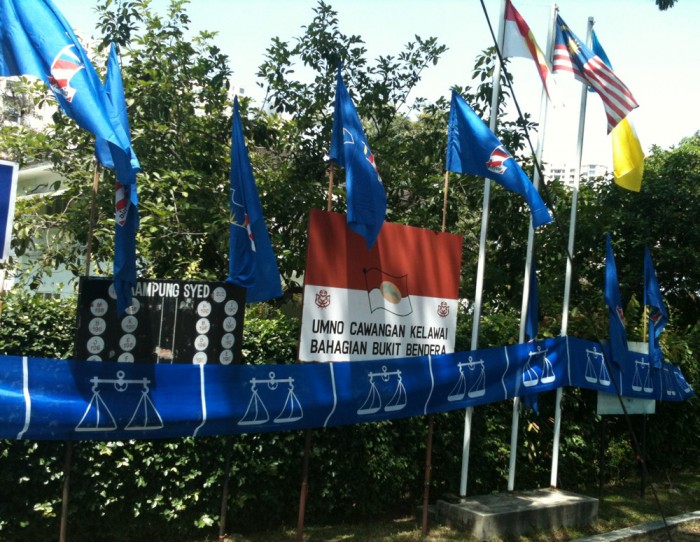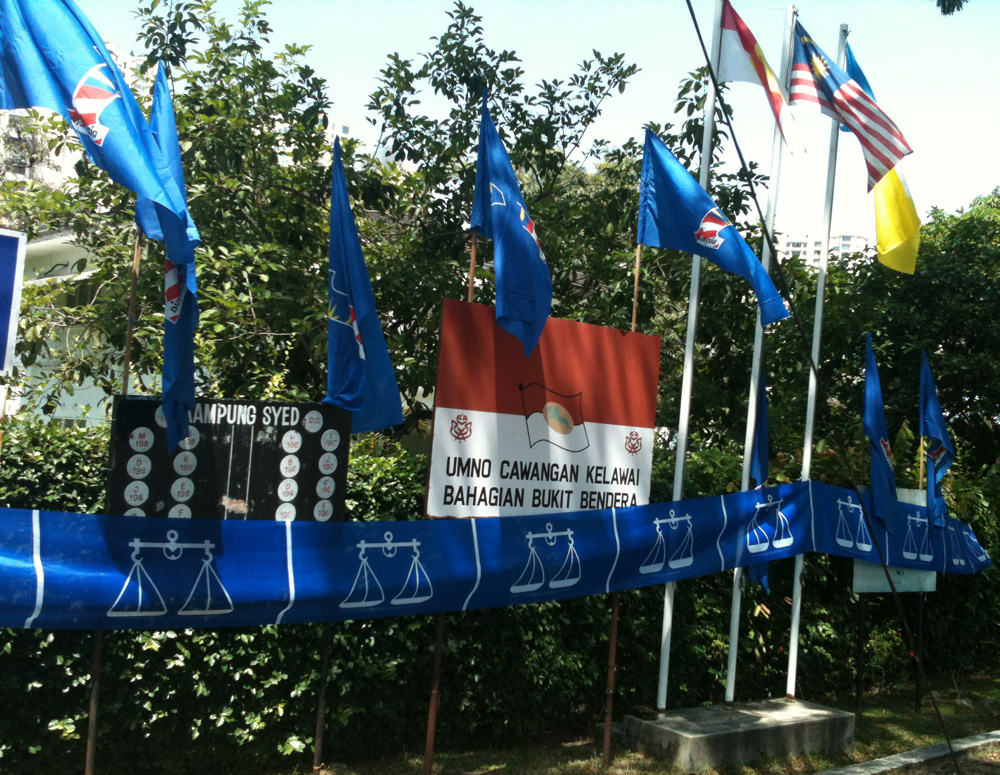
After months of speculations, Prime Minister Najib Abdul Razak has announced the dissolution of Parliament today, paving the way for the 13th general election.
Najib will be seeking his first mandate since assuming the post of prime minister on April 3, 2009, after taking over from Abdullah Ahmad Badawi. Today is exactly four years since Najib became premier.
During the 2008 General Election, Barisan Nasional, the current ruling party, under the leadership of Abdullah Ahmad Badawi won 140 parliament seats, its worst performance since the 1969 election.
The election also saw the opposition coalition Pakatan Rakyat under the leadership of its de facto leader Anwar Ibrahim winning 82 seats automatically denying Barisan Nasional its two-thirds majority which is the requirement to pass bills and amendments to the Federal Constitution.
The opposition also gained 5 of the 13 state assemblies which enabled them to form state governments under the Pakatan Rakyat banner.
Among the ruling coalition there are hidden feelings that another political tsunami is in the offing in the impending general election.
Most of the top leadership in the Pakatan Rakyat coalition feels that this is the closest ever of their chances to wrest Putrajaya from the clutches of Barisan Nasional.
Anticipating the whole process which will take place from today up to the polling day, it would be good if we can spend some time understanding the democratic system practised in Malaysia.
What is Election?
Election is a process to choose a government through an electoral process.
It is a process or system that enables a citizen of a nation to choose a leader and also political party to rule the country.
It is also one of the important aspects in democracy system of a country.
In Malaysia there is cry for a more liberalised, free and fair election.
What is the advantage of free and fair elections?
Free and fair election allows people to live in a representative democracy to determine the political makeup and future policy direction of their government.
A free and fair election also increases the likelihood of a peaceful power transfer during the transition period.
It also helps to ensure the losing candidate to accept the validity of the election results and cede power to the newly elected government.
The function of election also serves up to strengthen stability and the legitimacy of one organization and political community.
As such a free and fair election of nation is vital in preserving the true value of democracy.
One Vote One Candidate System
In our country, there are two types of election.
First, the general election for the whole country, held once in every five years.
The next is the by-elections, also considered a general election because the concept of the election itself constitutes the choosing of a representative by the public citizens for the Parliament and the State Legislative Assembly.
There are clear differences between these two types of election.
The former is only held after Parliament or the State Legislative Assembly is dissolved while the latter do not involve the dissolution of any of the assembly nor do they follow a fixed schedule.
By-election normally occurs when the incumbent has died or resigned.
The last by election held in Malaysia was at N.28 Kerdau Pahang on 6th March 2011 when its incumbent Zaharuddin Bin Abu Kassim died of heart attack.
The system that we used in Malaysia to vote is base on the law of “one vote one candidate system”.
Prior to carrying out the election, the Yang di-Pertuan Agong must first dissolve the Parliament on the advice or at the request of the Prime Minister.
At the state level, a general election is held after the State Legislative Assembly is dissolved by the Ruler or Yang Dipertua Negeri at the request of the Menteri Besar or Chief Minister.
As soon as Parliament is dissolved, the elections must be held within 60 days in West Malaysia and within 90 days in Sabah and Sarawak.
The time specified is reasonable for the Election Commission or EC, to prepare the election arrangements and the contesting parties to get ready, hold campaigns and construct definite strategies following the regulations or laws that have been fixed from time to time.
For a general election, after the Yang di-Pertuan Agong dissolves Parliament at the request of the Prime Minister and the EC will issue an order to the Managing Officer to organize the balloting process (election).
The responsibility of the Managing Officer is to issue a statement, through the Government Gazette or newspaper, on the date of nomination of candidate for the said election,the place and the time of election for every electoral constituency.
The EC also determines the date and place of balloting.
Candidacy
Any candidate who wishes to contest must obtain a nominator, a person who nominate or a seconder and at least four other people, whose names are recorded in the nomination paper.
They must also be a registered voter in the voter register of the constituency where the candidate is contesting.
The balloting day can be held after 3 weeks from the date of nomination but cannot exceed more than 8 weeks.
On the balloting day, all voters who qualify to vote can carry out their responsibility by casting their votes in balloting places provided.
Before the balloting day arrives, the contesting parties are allowed to carry out election campaigns through political talks.
The freedom of speech and assembly during the campaigns also show that the basic freedom as embodied in Article 10 of the Federal Constitution are protected in the country which practices a democratic system of government.
However, to ensure public security all political talks either by the ruling party or the opposition, it is necessary to get police approval or permit.
When the day to vote comes, every voter is given two sheets of ballot papers of different colours, one for the State Legislative Assembly constituency and the other for the parliamentary constituency.
On each ballot paper there are symbols representing the contesting candidates and the space for the voter to make his choice.
The responsibility of voting is completed with the voter marking ‘X’ in the space provided against the symbol representing the candidate of the voter’s choice.
The ballot papers are put into separate ballot boxes for the Parliamentary constituency and the State Legislative Constituency.
After all this process is done all the ballot papers for the Parliamentary and State Legislative Constituency will be taken to balloting center for the final count and finally for the result announcement that will be announce by the Director of Election Commission.











